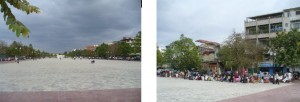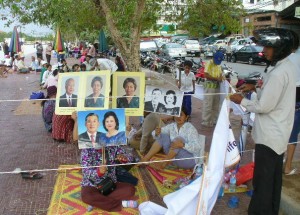The Mirror, Vol. 15, No. 698
Note:
Apologies for the delay, for health reasons – or, more correctly: because of being sick.
Norbert Klein
The newly elected members of the US House of Representatives had their first meeting on Thursday, 6 January 2011. Their meeting started with something that had never before happened: the whole text of the Constitution of United States of America was read aloud, with Republicans and Democrats taking turns to read passages from this 223 years old document. This procedure had been proposed by newly elected members, so that all should be reminded about the basis on which to work together.
While mirroring what happens in Cambodia, including when there are controversies and conflicting opinions, we have frequently quoted from the Constitution of the Kingdom of Cambodia, hoping that this may shed light on how to appraise what is going on.
But it is obvious that not all sections of the Constitution are having the same weight. We read, for example, in Article 34 that Khmer citizens, at least eighteen years old, have the right to vote, and citizens, at least twenty-five years old, to have the right to stand as candidates for elections. Such rules are different in different countries – and some changes in Cambodia, up or down, could, maybe at a certain time, be considered without causing fundamental concerns.
But this is not true for all articles.
If proposals were ever made to change, for example, Article 38, which says, “The law shall protect the life, honor, and dignity of the citizens,” or Article 39, which says, “Khmer citizens shall have the right to denounce, make complaints or file claims against any breach of the law by state and social organs…” or in Article 40, which states, “The rights to privacy of residence, and to the secrecy of correspondence by mail, telegram, fax, telex and telephone shall be guaranteed” – there would be serious question to be faced: Would this then still be the same Kingdom of Cambodia, which the Preamble of the Constitutions describes as an “‘Island of Peace’ based on a multi-party liberal democratic regime guaranteeing human rights and the respect of law…”
Specific situations have to be considered under this aspect. And in some cases and actions in public, it is obvious that some may be in accordance with the letter of the law – but still people question if they conform to the spirit of the law.
Article 37 and Article 41 of the Constitution say:
The right to strike and to non-violent demonstration shall be implemented in the framework of a law.
Khmer citizens shall have freedom of expression, press, publication and assembly. No one shall exercise this right to infringe upon the rights of others, to effect the good traditions of the society, to violate public law and order and national security.
Ever since a law in October 2010 instituted places called “Freedom Parks” – សួនសេរីភាព- Suon Sereipheap – for all provinces to hold demonstrations, there is a concerned discussion going on, even internationally: the new legislation is considered by critics as a measure to curtail the freedom of expression, and to protect the government to have to listen to protesting voices. The Mirror had referred to these developments in July and in September last year.

The Freedom Park in Phnom Penh – 60 by 200 meters of barren space, no trees in the park to protect from the sun – does not look at all like what one expects when going to a park. While the place can hold up to 5,000 people according to the chief of police of Phnom Penh, the law allows only a maximum of 200 people to protest in a spontaneous way, while larger events require written permission from the authorities 5 days ahead of time, depending on the presentation of detailed information about plans, which probably can be provided only for well organized meetings – not for free and spontaneous expressions by non-violent gatherings of more than 200 concerned or desperate citizens.
No wonder that in some parts of the international media the comparison of the Freedom Parks’s with the Speakers’ Corner in London’s Hyde Park is rejected, as the Speakers’ Corner is not the only place in London where public expressions of opinion are legal. Many consider it to be a measure to keep protesters isolated and far away from government offices, the National Assembly, or from the residence of the Prime Minister – so far a frequent venues of protests against perceived injustices in the country, by citizens who come to Phnom Penh, trusting that the Prime Minister and his wife, or the Father King and his wife, will assist, where local power holders at home have put them into distress.
Since the beginning of the week, up to 200 people are at the Freedom Park, facing eviction from their homes around the Boeung Kak lake, as they consider the compensation to move away to be not sufficient. “We have been protesting here for two days, but no government officials came to meet us.” And another voice says, ”I am prepared to face death by not leaving the place I use to live, because I do not know were else to go.”
While confrontations related to the relocation of about 4,000 families have been going on since 2007, when the previously unknown company Shukaku received a 99 years lease for the lake and surrounding ares without public bidding, it had been assumed that this was based on specific plans; recently, it was reported that the Council for the Development of Cambodia had not yet received a Master Plan to consider. The identity of the company Shukaku, receiving a large piece of public land, was kept so secret that the residents of the area were even made to believe that it is a Korean company – but when they protested at the South Korean embassy in Phnom Penh, the ambassador assured them that there was no Korean involvement. Then the owner of the company became known to be Mr. Lao Meng Khin, a member of the Cambodian Senate.
Since about two weeks ago, new information is widely reported. Chinese language publications from September 2010 became known, mentioning that contracts had been signed in July 2010 with two Cambodian companies to develop the “Ten Thousand Valleys” [万谷 – “wan gu” in Mandarin pronunciation, but “man kok” in Cantonese, which is close to “ban kok” – an obvious phonetic rendering of the Khmer “Boeung Kak” – the name of the lake].
The Chinese Inner Mongolia Erdos Hung Jun Investment Company is said to have contracts with two Cambodian companies – though not many details are disclosed – but their plan is part of a US$ 3 billion arrangement which includes also a 750-megawatt electricity power station to be operated by coal in Sihanoukville, and bauxite exploration in Mondolkiri. After a visit on 8 September 2010 by high ranking representatives of the Chinese company, meeting also with Prime Minister Hun Sen, the plan for the power station was mentioned, but not any involvement with the Boeung Kak lake filling and the plans for its urban development.
People demonstrating at the Freedom Park are now aware that their eviction – or a solution for their compensation claims – depend also on this Chinese company. They now appeal to this company to enter into negotiations. But there is confusion, as they say: When we try to talk to Shukaku, we are told to talk to the government; when we try to talk to the government, we are told to talk to Shukaku.
This situation is not only deeply deplorable – this lack of transparency, related to massive dealings with the Boeung Kak Lake and thousands of people affected, is extremely surprising at a time, when even small Cambodian NGOs are to be made subject to new legal regulations: to provide more transparency about their operational and financial activities.
Norbert KLEIN
Please recommend The Mirror also to your colleagues and friends.


Recent Comments